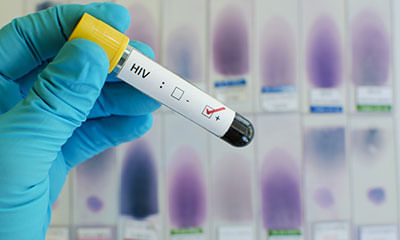Get the App
For Doctors
Login/Sign-up
About
Health Feed
AllQ&AsTips
Trioday 300 Mg/300 Mg/600 Mg Tablet Health Feed
Asked for male, 27 years old from Patna
Share
Bookmark
Report
The natural course of chronic hepatitis B progresses through three stages: immune tolerance, active disease, and a late phase with reduced viral replication
Approximately 25 per cent of patients with chronic hepatitis B will develop cirrhosis, causing permanent and serious liver damage.
Chronic carriers of HBV are far more likely to develop hepatocellularcarcinoma than non-carriers
The course of hepatitis B is determined by many factors, including immune response, host genetic factor...more
Approximately 25 per cent of patients with chronic hepatitis B will develop cirrhosis, causing permanent and serious liver damage.
Chronic carriers of HBV are far more likely to develop hepatocellularcarcinoma than non-carriers
The course of hepatitis B is determined by many factors, including immune response, host genetic factor...more
Health Query
Share
Bookmark
Report
Acute hepatitis B infection lasts less than six months. Your immune system likely can clear acute hepatitis B from your body, and you should recover completely within a few months. Most people who acquire hepatitis B as adults have an acute infection, but it can lead to chronic infection.
Chronic hepatitis B infection lasts six months or longer. When your immune system can't fight off the acute infection, hepatitis B infection may last a lifetime, possibly leading to serious illnesses such ...more
Chronic hepatitis B infection lasts six months or longer. When your immune system can't fight off the acute infection, hepatitis B infection may last a lifetime, possibly leading to serious illnesses such ...more
2363 people found this helpful
Health Query
Share
Bookmark
Report
Hepatitis B infection may be either short-lived (acute) or long lasting (chronic).
Acute hepatitis B infection lasts less than six months. Your immune system likely can clear acute hepatitis B from your body, and you should recover completely within a few months. Most people who acquire hepatitis B as adults have an acute infection, but it can lead to chronic infection.
Chronic hepatitis B infection lasts six months or longer. When your immune system can't fight off the acute infection,...more
Acute hepatitis B infection lasts less than six months. Your immune system likely can clear acute hepatitis B from your body, and you should recover completely within a few months. Most people who acquire hepatitis B as adults have an acute infection, but it can lead to chronic infection.
Chronic hepatitis B infection lasts six months or longer. When your immune system can't fight off the acute infection,...more
Health Query
Share
Bookmark
Report
Hepatitis B infection may be either short-lived (acute) or long lasting (chronic).
Acute hepatitis B infection lasts less than six months. Your immune system likely can clear acute hepatitis B from your body, and you should recover completely within a few months. Most people who acquire hepatitis B as adults have an acute infection, but it can lead to chronic infection.
Chronic hepatitis B infection lasts six months or longer. When your immune system can't fight off the acute infection,...more
Acute hepatitis B infection lasts less than six months. Your immune system likely can clear acute hepatitis B from your body, and you should recover completely within a few months. Most people who acquire hepatitis B as adults have an acute infection, but it can lead to chronic infection.
Chronic hepatitis B infection lasts six months or longer. When your immune system can't fight off the acute infection,...more
2316 people found this helpful
Asked for male, 5 years old from Mathura
Share
Bookmark
Report
Acute hepatitis B infection lasts less than six months. Your immune system likely can clear acute hepatitis B from your body, and you should recover completely within a few months. Most people who acquire hepatitis B as adults have an acute infection, but it can lead to chronic infection.
Chronic hepatitis B infection lasts six months or longer. When your immune system can't fight off the acute infection, hepatitis B infection may last a lifetime, possibly leading to serious illnesses such ...more
Chronic hepatitis B infection lasts six months or longer. When your immune system can't fight off the acute infection, hepatitis B infection may last a lifetime, possibly leading to serious illnesses such ...more
4864 people found this helpful
Asked for male, 42 years old from Veraval
Share
Bookmark
Report
Acute hepatitis B infection lasts less than six months. Your immune system likely can clear acute hepatitis B from your body, and you should recover completely within a few months. Most people who acquire hepatitis B as adults have an acute infection, but it can lead to chronic infection.
Chronic hepatitis B infection lasts six months or longer. When your immune system can't fight off the acute infection, hepatitis B infection may last a lifetime, possibly leading to serious illnesses such ...more
Chronic hepatitis B infection lasts six months or longer. When your immune system can't fight off the acute infection, hepatitis B infection may last a lifetime, possibly leading to serious illnesses such ...more
2428 people found this helpful
Asked for female, 23 years old from Adilabad
Share
Bookmark
Report
Acute hepatitis B infection lasts less than six months. Your immune system likely can clear acute hepatitis B from your body, and you should recover completely within a few months. Most people who acquire hepatitis B as adults have an acute infection, but it can lead to chronic infection.
Chronic hepatitis B infection lasts six months or longer. When your immune system can't fight off the acute infection, hepatitis B infection may last a lifetime, possibly leading to serious illnesses such ...more
Chronic hepatitis B infection lasts six months or longer. When your immune system can't fight off the acute infection, hepatitis B infection may last a lifetime, possibly leading to serious illnesses such ...more
2406 people found this helpful
Asked for male, 24 years old from Navi Mumbai
Share
Bookmark
Report
Pep is a treatment taken after potential exposure to hiv to reduce the risk of infection. It is typically recommended to start pep as soon as possible, preferably within 72 hours but no later than 72 hours after exposure.
Stribild (formerly known as spegra) is one of the regimens used for pep, and it contains four different antiretroviral drugs: elvitegravir, cobicistat, emtricitabine, and tenofovir disoproxil fumarate. This combination has been approved for both hiv treatment and prevention...more
Stribild (formerly known as spegra) is one of the regimens used for pep, and it contains four different antiretroviral drugs: elvitegravir, cobicistat, emtricitabine, and tenofovir disoproxil fumarate. This combination has been approved for both hiv treatment and prevention...more
125 people found this helpful
Asked for male, 27 years old from Delhi
Share
Bookmark
Report
This early-release guideline makes available two key recommendations that were developed during the revision process in 2015. First, antiretroviral therapy (ART) should be initiated in everyone living with HIV at any CD4 cell count. Second, the use of daily oral pre-exposure prophylaxis (PrEP) is recommended as a prevention choice for people at substantial risk of HIV infection as part of combination prevention approaches. The first of these recommendations is based on evidence from clinical tri...more
Asked for male, 26 years old from Bhopal
Share
Bookmark
Report
Hello,
Thanks for your query on Lybrate
"As" per your clinical history is concerned HIV can spread from sexual contact or via infected blood so first check if she is not a HIV patient.
To prevent it in future follow like this -
1) Try to use a new condom every time you have sex. If you don't know the HIV status of your partner, use a new condom every time you have anal or vaginal sex. Women can use a female condom. Use only water-based lubricants. Oil-based lubricants can weaken ...more
Thanks for your query on Lybrate
"As" per your clinical history is concerned HIV can spread from sexual contact or via infected blood so first check if she is not a HIV patient.
To prevent it in future follow like this -
1) Try to use a new condom every time you have sex. If you don't know the HIV status of your partner, use a new condom every time you have anal or vaginal sex. Women can use a female condom. Use only water-based lubricants. Oil-based lubricants can weaken ...more
432 people found this helpful
Ask a free question
Get FREE multiple opinions from Doctors
posted anonymously









